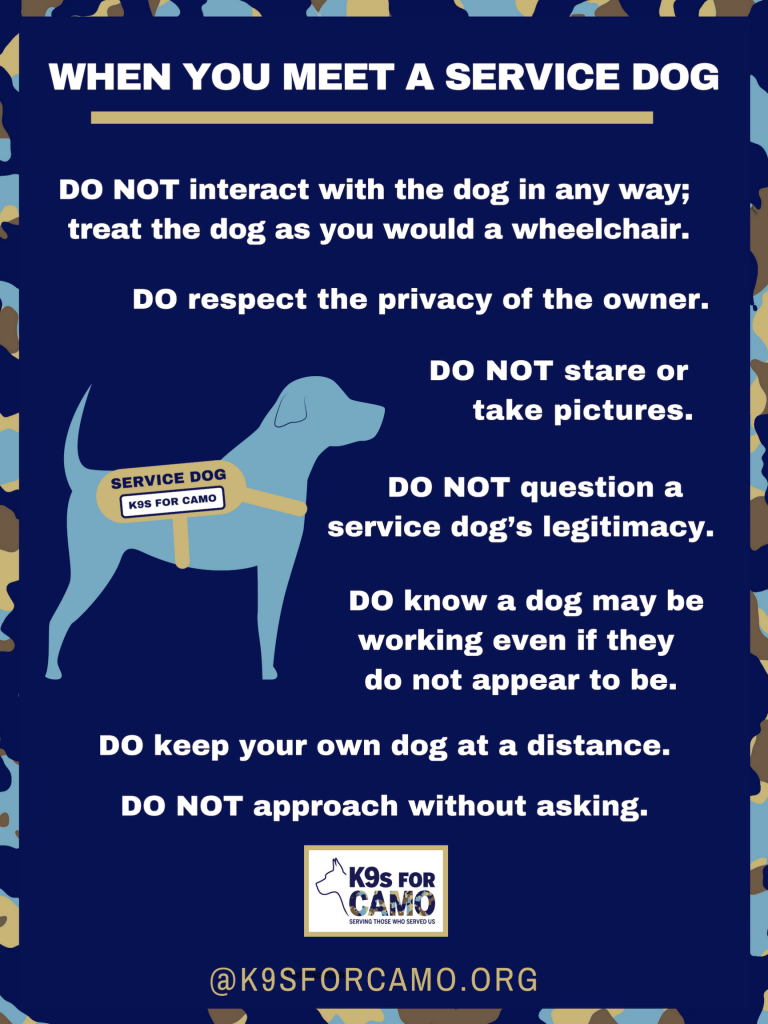Service Dogs,
Emotional Support Animals
and Therapy Dogs



About Service Dogs
The American with Disabilities Act (ADA) grants special access and rights to service dogs for individuals with disabilities. Incomplete knowledge of the ADA, as well as misunderstanding the differences between service dogs, emotional support animals and therapy dogs, has created the potential to abuse the system and resulted in recent controversy.
To help clear up some of the confusion and misinformation, we list below some excerpts from Revised ADA Requirements: Service Animals, as well as general information about emotional support animals (ESAs) and therapy dogs, explaining what they are and how they differ from service dogs in both function and legal rights.
But first, In response to common questions about service dogs:
- The Americans with Disabilities Act (ADA) does not require service dogs to be registered or certified. They also are not required to wear a harness or vest identifying them as service dogs.
- The only two questions a business may legally ask regarding a service dog are (1) is the dog a service animal required because of a disability, and (2) what work or task has the dog been trained to perform. K9s For Camo does provide our veteran K9 teams ID cards to help ease situations in which the validity of the K9 service dog is questioned, but they are not legally required to show them.
- ESAs and therapy dogs are not service dogs, as defined by the ADA, and do not have the same rights to public access as service dogs (see below for more information about ESAs and therapy dogs).
It is unethical, and in some states, illegal to misrepresent an animal as a service animal.
Excerpts from Revised ADA Requirements:
Service Animals

How “Service Animal” is Defined
Service animals are defined as dogs who are individually trained to do work or perform tasks for people with disabilities. The work or task a dog has been trained to provide must be directly related to the person’s disability. Dogs whose sole function is to provide comfort or emotional support do not qualify as service animals under the ADA.
Where Service Animals Are Allowed
Under the ADA, state and local governments, businesses, and nonprofit organizations that serve the public generally must allow service animals to accompany people with disabilities in all areas of the facility where the public is normally allowed to go.
Service Animals Must Be Under Control
Under the ADA, service animals must be harnessed, leashed, or tethered, unless these devices interfere with the service animal’s work or the individual’s disability prevents using these devices. In that case, the individual must maintain control of the animal through voice, signal, or other effective controls.
Inquiries, Exclusions, Charges, and Other Specific Rules Related to Service Animals
When it is not obvious what service an animal provides, only limited inquiries are allowed. Staff may ask two questions: (1) is the dog a service animal required because of a disability, and (2) what work or task has the dog been trained to perform. Staff cannot ask about the person’s disability, require medical documentation, require a special identification card or training documentation for the dog, or ask that the dog demonstrate its ability to perform the work or task.
A person with a disability cannot be asked to remove his service animal from the premises unless: (1) the dog is out of control and the handler does not take effective action to control it or (2) the dog is not housebroken.
People with disabilities who use service animals cannot be isolated from other patrons, treated less favorably than other patrons, or charged fees that are not charged to other patrons without animals. In addition, if a business requires a deposit or fee to be paid by patrons with pets, it must waive the charge for service animals.
for the complete ADA document: www.ada.gov/service_animals_
for service dog laws by state: https://www.animallaw.info/topic/table-state-assistance-animal-laws

About Emotional Support Animals
Emotional Support Animals (ESAs):
- Provide therapeutic support to people with psychological conditions, such as anxiety or PTSD.
- Must be prescribed by a licensed mental health professional.
- Are not the same as psychiatric service dogs. ESAs
 are not required to be trained, nor are they required to perform specific tasks. They provide emotional support through their companionship and by comforting their owner.
are not required to be trained, nor are they required to perform specific tasks. They provide emotional support through their companionship and by comforting their owner.
- Are specifically excluded by the American Disabilities Act and do not have the same legal access to public places as service dogs. Dogs whose sole function is to provide comfort or emotional support do not qualify as service animals under the ADA.
- Are only legally granted special access on airplanes and housing. Both the Air Carrier Access Act and the Fair Housing Act broaden the definition of assistance animal to include ESAs:
– The Air Carrier Access Act allows ESAs to accompany their owner in the cabin of commercial airplanes. Airlines can require documentation and rules vary from airline to airline.
– The Fair Housing Act also includes ESAs in the definition of assistance animal and requires that ESAs be allowed in many housing situations otherwise banning pets.
Reminder: It is unethical, and in some states illegal, to misrepresent an Emotional Support Animal as a service animal.
More reading: AKC – Everything You Need to Know About Emotional Support Animals
About Therapy Dogs
Therapy Dogs:
- Most commonly work with their owner as a team, visiting people in need of comfort or cheering up. They may help combat loneliness in nursing homes, fear in hospitals, or alleviate the stress of a child learning to read. Some reside in facilities, usually nursing homes, while others assist in rehabilitation facilities.

- Are generally friendly, well-mannered and well-trained in obedience. Most, at minimum, are required to earn the AKC Canine Good Citizen certification, and usually are tested further to gage temperament and reactions to stimuli they may encounter while “on duty” (i.e. wheelchairs, children, loud noises…).
- Are not trained to perform specific tasks to assist an individual with a disability.
- Are not covered under the ADA and do not have any designated legal rights to access public places. Institutions, such as hospitals and nursing homes, that otherwise may ban pets, might grant access to therapy dogs, but are not legally required to do so.
Reminder: It is unethical, and in some states illegal, to misrepresent a therapy dog as a service animal.
More reading: AKC Therapy Dog Program


 are not required to be trained, nor are they required to perform specific tasks. They provide emotional support through their companionship and by comforting their owner.
are not required to be trained, nor are they required to perform specific tasks. They provide emotional support through their companionship and by comforting their owner.

















